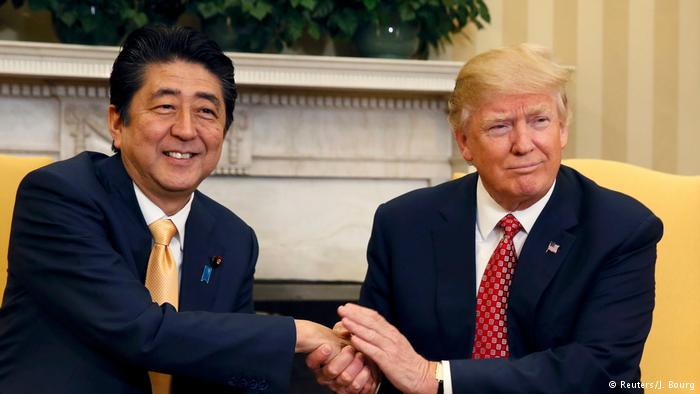
In a joint White House press conference Friday afternoon, the US president also said his administration would work to strengthen US-Japanese ties and bring the two nations closer together.
“The bond between our two nations and the friendship between our two peoples runs very, very deep,” Trump said. “This administration is committed to bringing those ties even closer.”
The American president also expressed great personal warmth towards Abe, who was the first foreign leader to meet Trump as president-elect, and said the two of them “have a very, very good bond.”
In further policy remarks, Trump thanked the Japanese Prime Minister for hosting American troops and reaffirmed America’s commitment to preserving freedom of navigation and maintaining Japan’s security, singling out defense against North Korea’s nuclear missile threat as a “very high priority.”
Economy dominates
Speaking after the president, the Japanese Prime Minister likewise praised the importance and solidity of the US-Japanese relationship and highlighted the chance to expand free trade and investment in a “fair manner” that would benefit both nations.
Abe noted the 150 billion dollar investments made by Japanese companies in the United States and expressed his optimism about future Japanese involvement in major American infrastructure projects, using the development of high-speed train as an example.
Though neither Abe nor Trump, who stated that bilateral trade relations must be “free, fair and reciprocal,” directly addressed questions from reporters pertaining to the US withdrawal from the Trans-Pacific Partnership (TPP), the leaders indicated they would discuss the matter further over the working lunch set to follow the press conference. The two leaders will then fly to Florida to go golfing at Trump’s private resort Mar-a-Lago.
Abe is the second foreign leader to visit Trump in the White House, following British Prime Minister Theresa May.
Business breakfast
Before joining the President in the White House, Japanese Prime Minister Shinzo Abe addressed the US Chamber of Commerce and sought to reassure nervous business leaders in both nations of the steady alliance between the United States and Japan. He breakfasted with the American business federation came at the start of a two-day visit to the United States.
“I wish to firmly build a relationship of trust at the leadership level with my visit to the United States, and to show to our people and the world the unwavering alliance between Japan and the United States,” Abe said.
Trump threatened Toyota for planning a plant in Mexico
The Japanese prime minister attempted to ameliorate what has become a tense economic atmosphere between the Pacific nation and the United States. Trump, who withdrew the United States from the Trans-Pacific Partnership (TPP), has criticized Japanese consumers for not buying enough American-made cars and attacked Japanese companies for shipping American manufacturing jobs overseas. In January, Trump threatened to slap a tariff on Toyota if the auto manufacturer went through with a planned factory construction in Mexico.
Abe highlighted the benefits that Japanese industry provides the United States, calling the economic cooperation between the nations “truly a win-win relationship.”
Most Japanese budget cars on American roads are produced in the United States by American workers, Abe also noted, adding that total investment by Japanese companies in the US approaches $411 billion and provides 840,000 jobs.
Abe is expected to announce an economic cooperation package that would create hundreds of thousands of new jobs in the United States as well as inject billions of dollars from the Japanese government and private sector into American infrastructure projects.
The weekend ahead
After his business breakfast, Abe headed to the White House to meet with Trump and senior White House officials in the Oval Office. The two leaders will give a joint press conference before heading to Florida to go golfing at Trump’s resort in Mar-a-Lago.
Abe previously met the then president-elect shortly after the November 9 vote in Trump Tower, the first foreign leader to do so. He is the second foreign leader to visit Trump in the White House, following British Prime Minister Theresa May.
